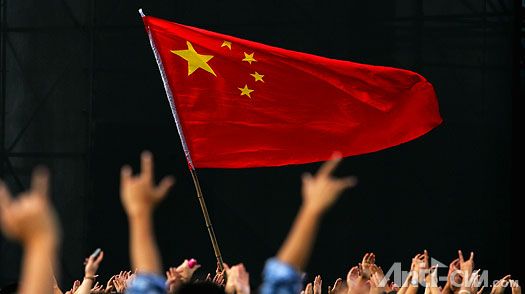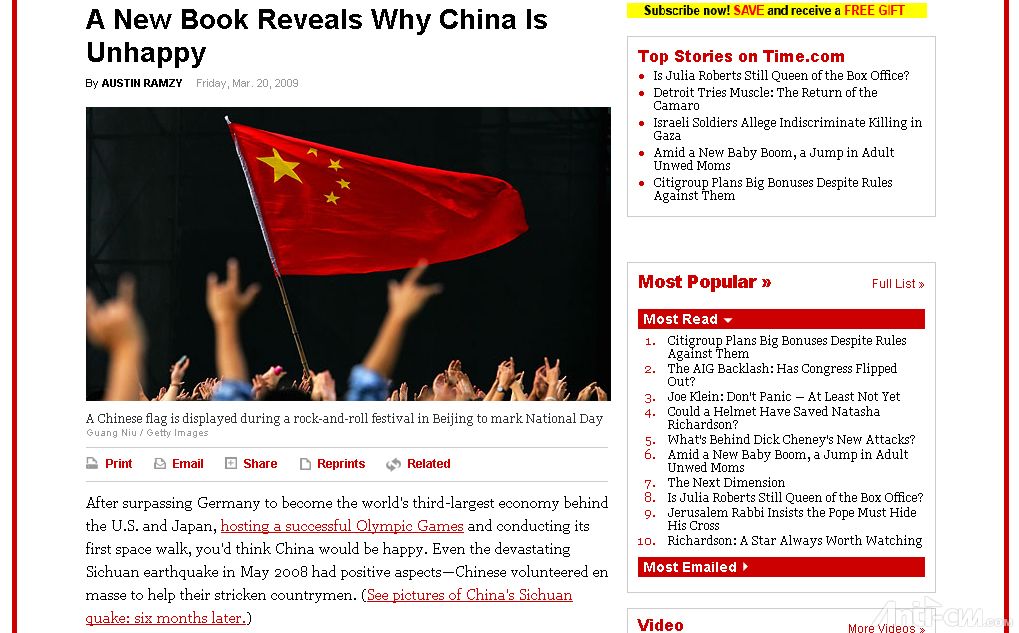|
|
本帖最后由 johnsonpersonal 于 2009-3-22 14:49 编辑
译者:外媒的这篇报道直接对《中国不高兴》这本书和点名对王小冬,宋强进行评论,话题比较敏感,译者怕有些字句由于翻译不当而无法正确表达原文意思,欢迎文中所涉及之人物和广大AC的朋友提出意思,我会及时修改。
【原文标题】A New Book Reveals Why China Is Unhappy
【中文标题】一本新书揭露为什么中国不高兴
【登载媒体】时代周刊
【来源地址】http://www.time.com/time/world/article/0,8599,1886749,00.html
【译者】Johnsonpersonal
【翻译方式】人工
【声明】本翻译供Anti-CNN使用,未经AC或译者许可,不得转载。
【译文】
A New Book Reveals Why China Is Unhappy
一本新书揭露为什么中国不高兴
By AUSTIN RAMZY Friday, Mar, 20, 2009
由AUSTIN RAMZY撰写,2009年3月20日,星期五

A Chinese flag is displayed during a rock-and-roll festival in Beijing to mark National Day
在北京,一面中国国旗展现在摇滚舞的会演中庆祝国庆节
Guang Niu / Getty Images
GUANG NIU/GETTY摄影
After surpassing Germany to become the world's third-largest economy behind the U.S. and Japan, hosting a successful Olympic Games and conducting its first space walk, you'd think China would be happy. Even the devastating Sichuan earthquake in May 2008 had positive aspects—Chinese volunteered en masse to help their stricken countrymen. (See pictures of China's Sichuan quake: six months later.)
在超越德国成为世界上继美国,日本后第三大经济体,举办了一次成功的奥林匹克运动会和实行它自己的首次太空行走后,也许会认为中国会高兴。甚至在2008年三月份四川的毁灭性的地震中也有积极一面-----中国人一同地自愿提供帮助他们受灾的同胞。(请看中国四川地震的组图:6个月)(译者:我会后整理这些组图,另开新贴,请关注)
Yet China is not pleased. That, at least, is the assertion of a new book written by a group of Chinese authors who list their grievances with how China is being treated in the world today. Unhappy China, released this month, is a follow-up to the 1996 work China Can Say No, a nationalist bestseller that complained about the influence of the West and the U.S. in particular on China. Thirteen years later, the authors of Unhappy China point to the protests along the route of the Olympic flame, complaints about pollution from China by Western nations that consume far more resources per capita, and the West's unwillingness to share key technology with China as examples of continuing foreign disdain for the Middle Kingdom. Song Qiang, who contributed to both China Can Say No and Unhappy China, writes in the latest work that China should reduce the importance of Sino-French relations because of French President Nicolas Sarkozy's meeting with the Dalai Lama, the exiled Tibetan spiritual leader that Beijing says is promoting separatism in the restive Himalayan region. (See pictures of China goes to Africa.)
然而,中国并不高兴。那,至少,是这本由一群中国作者写的新书的说法,(这些作者)列出他们的不满:如何看待当今世界中的中国。《中国不高兴》这个月发行,是继1996年《中国可以说不》后的一本民族主义者的畅销书,抱怨西方特别是美国对中国的影响。13年后,《中国不高兴》的作者指责在沿奥林匹克火炬传递路线的抗议,抱怨西方国家高的人均消费对中国造成的污染,西方国家不愿意与中国分享关键性技术。宋强,《中国可以说不》和《中国不高兴》的撰稿人,在其最新的著作中写道,中国应该简化中法关系,因为法国总统萨科齐与达赖喇嘛会面,北京认为这个流亡的西藏精神领袖正乱动的喜玛拉雅地区推动分离主义。(看组图:中国走向非洲) (译者:我会后整理这些组图,另开新贴,请关注)
The March 8 confrontation between an unarmed U.S. Navy surveillance vessel and Chinese ships off China's Hainan Island, the site of a major People's Liberation Navy base, only reconfirmed the authors' notion of foreign states bent on encroaching upon China. "If Obama wants to talk about world peace, not sending troops abroad and so on, then what is the U.S. Navy doing in the South China Sea?" says Wang Xiaodong, a nationalist scholar who contributed several chapters to "Unhappy China."
三月八日,一艘没有武装的美国海军盯梢船和中国船只间在在中国海南岛(一个主要的人民解放军的海军基地)外的对抗,更加强了作者认为外国执意侵犯中国的看法。“如果奥巴马想谈世界和平,不要向海外派兵等等,那么美国海军在南海做什么呢?”王小东说,一个民族主义者学者,《中国不高兴》里几个篇章的撰稿人。
Nationalism can be a powerful force in China. Fueled by a century and a half of foreign occupation and an education system that emphasizes that era of national weakness, patriotic sentiment can flash at times when citizens feel that the nation's interests or dignity have been violated, as when the protests during the Olympic torch's global run spurred Chinese anger.
民族主义可以在中国成为强在的力量。是被一个半世纪的外国入侵和强调国家虚弱的教育系统所燃烧的,当国民感到国家的利益或尊严被侵犯的时候,爱国情绪就在那时闪耀,所以当在奥林匹克火把全球传递出现抗议的时候,就激起中国人的怒火。
While nationalism can help unify the country to respond to events like the Sichuan earthquake, the fear is that if the sentiment flares unchecked, it could push Beijing to take a belligerent, isolationist line.
虽然民族主可以帮助国家响应如(帮助)四川地震这样的事情,担心的是这些态度不受遏制的兴旺起来,会把北京带到好战的,孤立主义的边上去。
Wang and Son also direct their ire at targets at home. They assert that China suffers from weaknesses in its political system and that democracy should be the nation's ultimate goal. But when they discuss democracy they are more likely to highlight the failures of India and the Philippines than to mention the top 20 nations on the United Nations Development Programs human development index, which are all democratic. In that regard they are much like the Chinese Communist Party, which says it is pursuing democracy "with Chinese characteristics," but argues that any moves to lessen its grip on power would risk chaos. Yet the authors are quick to distance themselves from the government. Wang says that much of the speech making by Chinese leaders is "empty" like that of Western politicians, that Beijing is still inept at wielding its growing clout abroad and that the country's obsession with the Beijing Olympics reflected a "weak nation's psychology." That independent streak and willingness to break with the Party is what makes nationalism such an unwieldy force for China's rulers. Nationalist sentiment can help unite China's citizenry around a cause like opposition to Tibetan independence during last year's protests and violence in Lhasa. But it can also turn against leaders who are seen as not pushing China's interests with sufficient force.
王(指王小冬)和宋(指宋强)也会把他们的愤怒直接指向国内。他们声称中国因为软弱的政治做法而受苦,民主是这个国最终的目标。但是当他们讨论民主的时候,他们都很大的可能去突出印度和菲律宾的失败,而不是提及前20个在联合国开发计划署人类发展指数的国家,这些都是民主国家。在这个方面,他们与中国共产党非常相似,他们说正在追求“有中国特色的”民主,但坚持主张任何减少在政权控制力的方案,都会引起混乱。然而,作者们很快就把他们自己和政府拉开,王说很多的由中国领导层的讲话都是“空洞的”,正如西方的政客一样,北京当局依然无法增加其在国外的影响力,从国家的“北京奥林匹克”困扰可以折射出一种“弱国心态”。这些独立的与周围不同的(观点)并愿意与政党分离的意愿,使民族主义成为一股难以控制的力量。民族主义情绪可以有助于团结中国国民为一个目标围在一起,比如在上年的在拉萨的抗议和暴力事件,反对西藏独立。但是它也可以转为反对不去花大力气去推动中国国家利益的领导人。
In talking with Wang and Song it's easy to get the feeling that it's not so much China that's unhappy and angry, but the authors themselves. The brand of nationalism they preach is still a potent force, but they seem more upset about rivalries at home than abroad. Wang cautions that the book's title is a bit of a ruse. "To be frank, those words in the title "Unhappy China" are just for the purpose of promoting the book in the marketplace," he says. "We didn't choose them. It was the people selling the book who chose the title, because it would sell well." If they could chose a title, Wang says it would have been "China's Goals for the Next 30 Years" or something similar. But who would want to read that?
在与王和宋的对话中可以很容易感觉到,中国并没有很多的不满和愤怒,仅仅是作者他们本身不满。他们所说的民族主义是很有威力的,但他们似乎对国内对抗的苦恼比国外要多。王警告说这本书的标题有使了点诡计。“坦白说,以‘中国不高兴’作为这本书的标题目的仅仅是为了在市场上进行推广”他说,“我们没有选择这个标题。是卖书的人(指出版商)选择的,因为这样可以卖得更好”。如果由他们去选择书的题目,王说可能会是“中国下一个30年的目标”或者是与之相似的标题。但谁会去看呢?
— With reporting by Jessie Jiang
— JESSIE JIANG报道。

---------------------------------------------
链接:《中国不高兴》封面

|
评分
-
1
查看全部评分
-
|